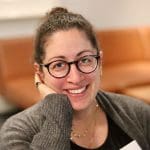Leading with lived experience

26 August 2022 at 1:31 pm
Najeeba Wazefadost fled Afghanistan at 10 years old by sea to seek refugee status in Australia and is now using her lived experience to lead for change in helping others. She is this week’s Changemaker.
At 10 years old, Najeeba Wazefadost fled Afghanistan with her parents. They sought asylum in Australia by sea in September 2000 and spent several months in mandatory immigration detention before being recognised as refugees.
All of Wazefadost’s childhood memories from back home are dark and she says her only hope was safety in Australia.
“My childhood was stolen. I don’t have good memories with other children, instead I remember being afraid; I remember persecution and death,” she says.
“We got on a rickety boat, not knowing where it was taking us; our safety and security limited to that piece of wood, risking starvation or drowning at sea.”
Wazefadost’s experiences have led her to believe that solutions to the problems refugees face are only effective when communities with lived experience are involved.
“It feels like my life journey led me to become a refugee and gender advocate. I don’t think I had much choice,” she says.
“When we arrived in Australia we were hopeful to start a better life, to establish safety and security and we desperately wanted to belong — to stop being relegated to being an asylum seeker or a refugee, and once again to have the value and rights of a citizen. Education played a key role in helping me feel like I belonged and to understand my rights.”
In this week’s Changemaker, Wazefadost – co-founder Global Refugee Network (GRN) and founder and CEO of the Asia Pacific Network of Refugees (APNOR) – explains how her advocacy is centred around sharing her story to help change the narrative.
Did you always want to work in the for-purpose space?
If I was not denied my right to an education as a girl, and my family have fled, I might have never become a refugee or a gender advocate.
How did you get into the job you’re in now?
I became the co-founder of refugee-led organisation Global Refugee Network (GRN) and the founder and CEO of the Asia Pacific Network of Refugees (APNOR) after seeing a noticeable absence of refugees and asylum seekers in policy discussions and matters that affect them.
Governments and international NGOs speaking about refugee’s lives without including them in these discussions was a massive problem. A lot of refugee policy focus has been on the criminal aspects of seeking asylum, issues like people smuggling. What we want to do is to talk about pathways and programs for refugees. To put them at the centre of policy discussions that will shape their lives and their children’s lives.
My main focus has been on enabling an environment where all actors, including Refugees, work together and promote meaningful engagement of Refugees and refugee-led organisations. I want to see a revolution in the participation and representation of Refugees in policies at all levels.
What does a typical day look like for you?
I wake up as an Afghan Australian woman with so many blessings around me. I start with a flood of emails and phone calls but something I do everyday is make sure I continue having conversations with people on the ground, the grassroots. I am obliged to consult and listen to at least one community every week to ensure what we do in APNOR is driven and based on their needs. We promote a bottom up approach that connects with their experience and promotes solutions that make a difference.
What are some of the challenges working in NFPs generally?
The biggest challenge is to convince donors in the refugee space to become flexible in grant making and having faith and trust in refugee-led organisations. One of the biggest barriers to refugee participation is access to funding. For us in APNOR we still struggle to find core cost funding and most is activity based funding. For example my own role as CEO has been voluntary for a very long time and I still spend a large amount of time looking for funding.
What is your proudest achievement?
One of my proudest achievements was registering APNOR as the first and only refugee-led network in the Asia region, based here in Australia.
I still celebrate the moment we announced our first refugee participation pledge at the UNHCR conference in Geneva. The pledge asked governments and other stakeholders to engage refugees in the design and implementation of protection programming and solutions. The pledge and subsequent policy discussions have proven that refugees are not only beneficiaries of humanitarian and development assistance but also change makers and solution finders.
My most recent achievement was being able to help and support my fellow Afghan women who have been internally displaced in Afghanistan to raise their plight and amplify their voices via poetry.
What do you think are some of the challenges being faced by the sector going forward?
Dismantling the power dynamic and lack of recognition, agency and ownership by refugee-led organisations.
What do you do when you’re not at work?
To be honest it’s rare for me not to be working, but when I do get spare time I spend it with my baby Sofia who is 18 months old.
What do you want to achieve by the time you retire?
Recently I have been reflecting on Australian policies and I have some desire to move into government and politics in some way.
Forced displacement might not end, but I hope there will be an end to inhumane refugee policies which punish people who are the innocent victims of issues outside their control.
I want APNOR to become more sustainable and able to resource our grassroots, local-led organisations who have no access to support and resources.







